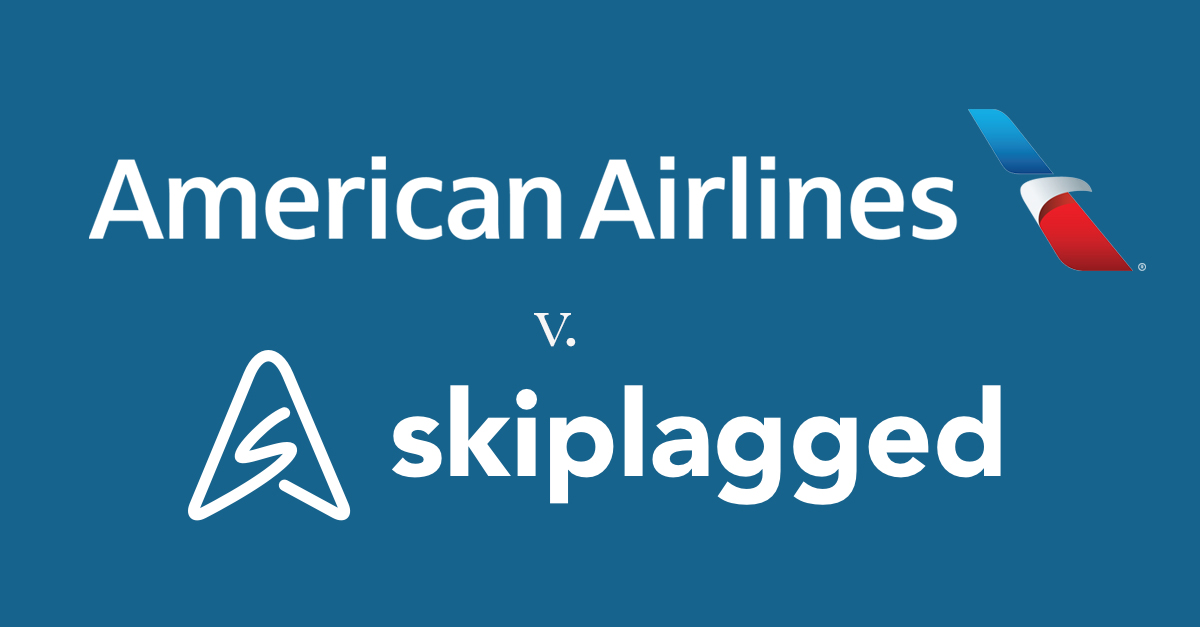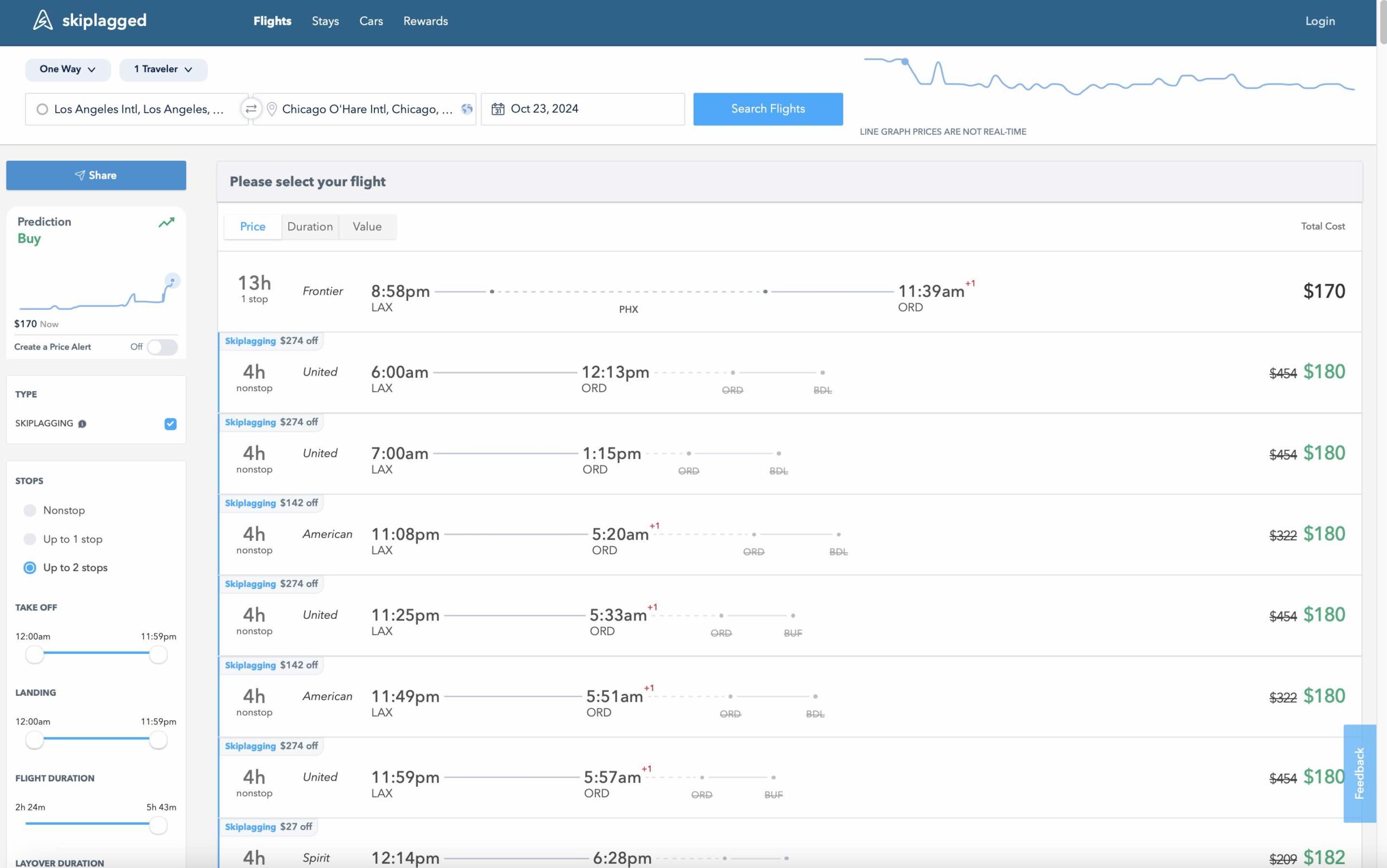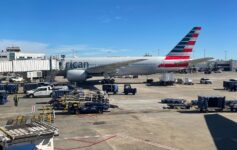
American Airlines won its lawsuit against Skiplagged for copyright infringement and was awarded $9.4 million by a Fort Worth jury, but lost its trademark claim. What does this mean for the future of Skiplagged?
American Airlines Wins Copyright Lawsuit Against Skiplagged, Awarded $9.4 Million By Jury
Hidden city ticketing, also called skiplagging as a testament to the growth of the Skiplagged website, is a practice where you book a connecting flight(s) via your intended destination in order to save money on the “nonstop” flight. Since airlines tend to charge a premium for nonstop service, this can save hundreds of dollars.
For example, Los Angeles to Chicago may be $480 but booking Los Angeles to Chicago on the same flight with a connection to Buffalo may drop the fare to $264. A savvy Chicago-bound flyer might book the connection to Buffalo then step off the flight in Chicago.
I wrote about the lawsuit when it was filed and during the trial. It has now concluded, with a jury awarding Skiplagged:
- $4.7 million in actual damages for copyright infringement
- $4.7 million in disgorgement of “ill-gotten” revenues derived from Skiplagged’s misconduct
But the jury also rejected AA’s trademark claim against Skiplagged. Copyright infringement occurs when someone uses a copyrighted work without the copyright owner’s permission, while trademark infringement occurs when someone uses a trademark without authorization in a way that could confuse consumers.
For purposes of this case, Skiplagged used the American Airlines logo on its site (until recently) and the jury held Skiplagged liable for that while also determining that consumers were not confused into thinking 1.) they were booking with American Airlines or 2.) American Airlines endorsed the website.
William Kirkman, the attorney for Skiplagged explained:
“We are very pleased with the jury’s decision on the trademark claim asserted by AA, as that is the claim that dominated the trial. As to the copyright damages, there are additional phases of the trial that need to take place before a final determination can be made.”
Kirkman added:
“Warnings on the site, including one that says, ‘Airlines don’t like when you miss flights to save money so don’t do this often,’ and a promotional message boasting, ‘We show you flights the airlines don’t want you to see,’ make it clear that Skiplagged is not, and doesn’t hold itself out as, an authorized business partner of American or any other airline.”
Of course, the defense attorney is going to try to be upbeat, but the copyright claim is no trivial matter.
I Warned Skiplagged In 2022…
While I am a big fan of Skiplagged and have no moral qualms with hidden city ticketing, I saw this lawsuit coming. In 2022, Skiplagged began masking some results (so you didn’t know where the extra leg was actually going) and charging a booking fee to book directly on the website, but did not disclose that booking fee until late in the booking process (not allowed by US Department of Transportation standards).
It was those booking fees, along with the use of the AA logo, that prompted the lawsuit. In an attempt to generate revenue from its “unique” metasearch results, Skiplagged became an online travel agency itself but had no booking agreement with American Airlines.
> Read More:How Skiplagged Lost Its Groove…
American Airlines Won Battle, But Did Skiplagged Win War?
If you check out Skiplagged this morning, all airline logos have been removed, but the site is operating as before, even showing American Airlines hidden city options:

If even the Trump campaign uses Skiplagged, you have to believe that the company easily recouped its $9.4 million in booking fees and may continue to do so, though it must be very careful not to sell tickets it is not authorized to sell, which could open it to further liability.
I do think Skiplagged helps flyers fight back against high fares and wish it success going forward.
CONCLUSION
American Airlines prevailed in its lawsuit against Skiplagged on the copyright claim, but the jury disagreed on the trademark claim, which importantly makes it easier for Skiplagged to continue operating. I agree with the jury: who really thought they were booking directly with American Airlines? From the very start, the trademark claim was much weaker than the copyright claim. American may have won the lawsuit, but also may have lost the war…




“ I wrote about the lawsuit when it was filed and during the trial. It has now concluded, with a jury awarding Skiplaged:”
Small error Matt
But correct verdict. I doubt AA will get a dollar for many years, if ever. This will be appealed forever and then if they are still liable will have made enough that this is pennies to them.
I’m probably dense, so forgive me, but I don’t understand the basis for the copyright infringement claim. The trademark suit failed, so the jury didn’t buy the argument that the use/display of AA’s trademarked logos/name created confusion in the marketplace.
What is the “work” which was subject to AA copyright which was used without permission for the successful copyright claim? Was it the price and itinerary information itself? Seems more like machine-made “data” than an actual creative work which could be subject to copyright…
AA Logo.
I am wondering what profit motive to the airlines there is to charging less for tickets that connect in a city rather than going onward. Perhaps to keep the gate reservation open at the non-hub airport? In any case, airlines could simply charge more for tickets that route through a hub instead of less so why do they?
There may be a regulatory mandate in place to serve certain cities but I wonder if that’s the case since the era of Reagan de-regulation. In any case, I think it’s largely unethical to engage in skiplagging for:
1) It’s a waste of a seat. That seat WILL be held until the door is closed because the airline is obligated to do so.
2) It may impact the ability for airlines to serve non-hub destinations.
If the airlines want my coding services, they could pay me to code something simple where if someone books a one way ticket without a checked bag, to notify them they’ll have to gate-eheck ANY baggage including carry ons.
It’s pretty simple. If you want to fly IND to ATL you have a bunch of DL flights and a couple of WN flights at inconvenient times. If you want to fly IND to JAX, you need to connect. Thus, DL, AA, and UA all compete for those flyers. So, DL may price IND-JAX at a competitive price with others and charge more than that for IND-ATL.
I don’t understand in that if JAX is a competitive route, why not offer more direct flights to it instead of routing through ATL in that people would happily pay more for a direct route rather than a connection? Also, if there are more people wanting to fly into ATL as a destination, rather than a hub, again, schedule more flights.
As far as I know, only airlines charge less for a connection via a hub versus train or bus where you simply will pay more for a additional stops although you get a volume discount for longer trips.
Because there are different levels of popular. So while IND-JAX might be popular, is it “fill an entire plane” popular? Not exactly. And thus the need to still connect.